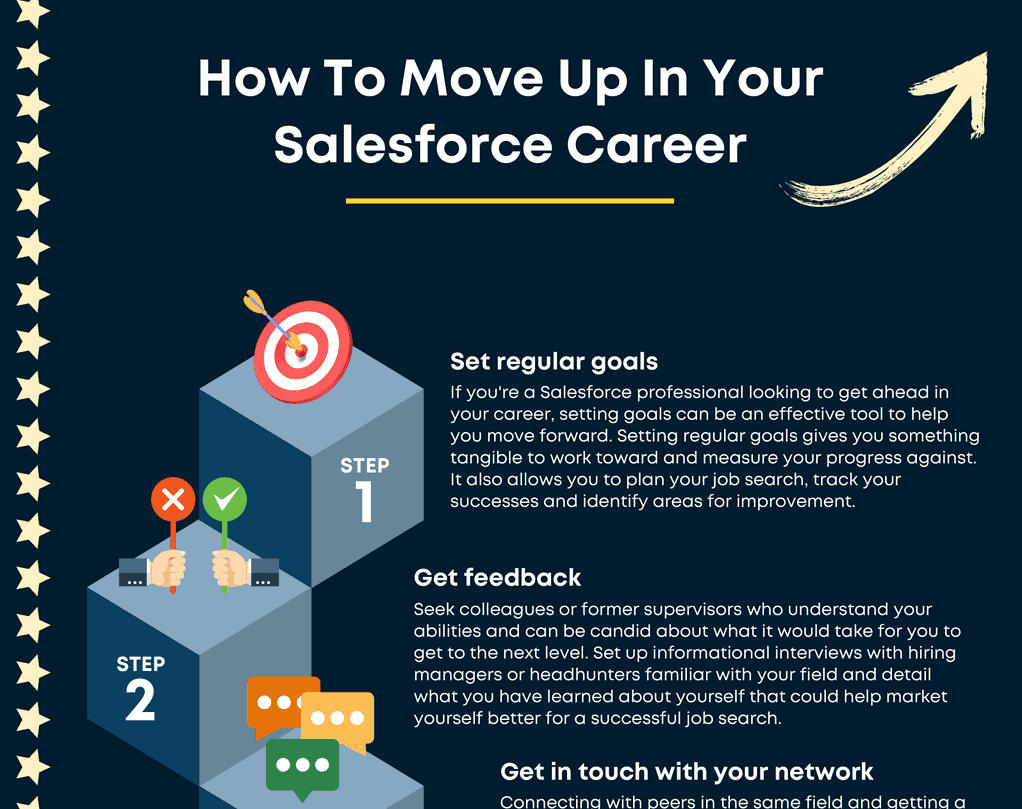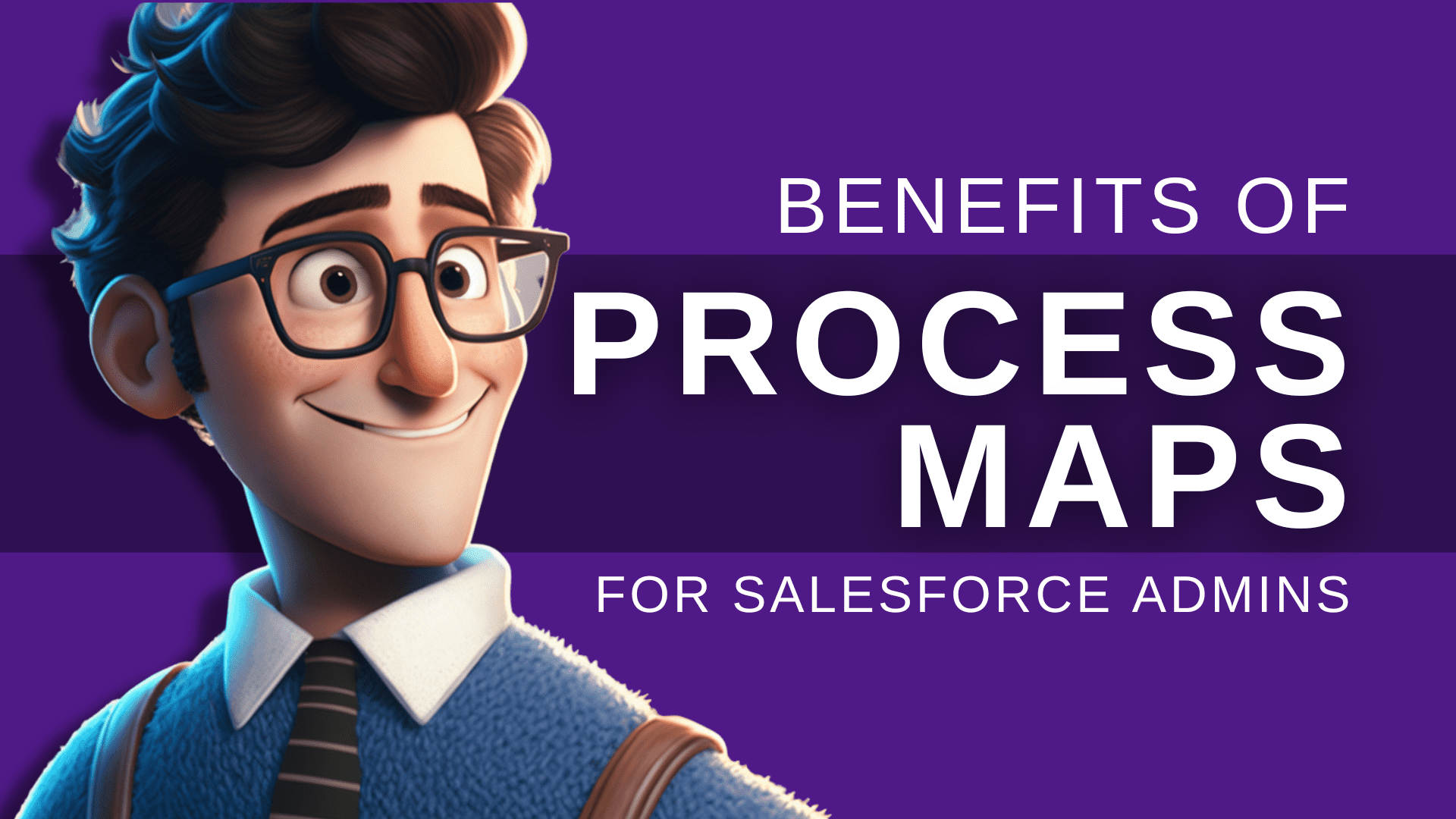How to Deal With Being Laid off From Your Salesforce Job

Make sure to download my FREE checklist to help you get your Salesforce Career on the right path!
Introduction
Losing a job can be a tremendously disheartening experience that rocks our world and leaves us feeling lost and powerless. No matter how long we’ve been in the Salesforce industry, no one is immune to these trying times when we find ourselves unemployed — it happens to all of us eventually. So if you’re currently being laid off from your role as a Salesforce professional, know that you are not alone.
In this blog post, I will share some practical tips to help open up possibilities for yourself during and after this challenging period, exploring ways you can continue to use your specialized skillset while easing into something new or different. With an open mind and the right mindset, anything is possible — let’s learn together how facing unemployment doesn’t have to mean utter defeat!
Don’t Panic
It can be tricky and confusing if you’ve recently been laid off or anticipate that it could happen soon. It is important to remember not to panic during this situation, as this can make the situation more complicated and challenging to navigate. Focusing on staying calm, taking things one step at a time, and getting organized will help you remain in control of your career journey.
At times like these, Salesforce professionals such as Admins, Developers, project managers, and business analysts may feel overwhelmed by the loss of their job or income. This is a normal reaction – even experienced professionals who have been through downsizing events may experience anxiety and fear about their prospects. However, they must remember that many opportunities are still available for those with a suitable skill set and attitude.
To approach this challenging situation with optimism and resilience, it’s essential to take some practical steps. Taking stock of your current financial situation is essential to create a budget reflecting your new circumstances while providing sufficient funds for necessities such as rent/mortgage payments and food. It’s also equally important to set realistic goals related to your career search – write out what kind of job you’d like next, create an action plan for submitting applications each day or week (e.g., will you search the job boards or use LinkedIn? etc.) and keep yourself accountable by setting reminders in your calendar or tracking progress in a spreadsheet. You should also try to connect with other Salesforce pros who have gone through similar situations; these professionals can offer valuable advice and support during this transition period.
Finally, don’t forget that there are other options beyond finding a new job; consider starting something on the side (freelance work or consulting) or taking time off to gain additional certifications or coursework related to the Salesforce field if possible; this could give you an edge over other candidates when applying for jobs in the future! Remember not to overwhelm yourself with too much information either – focus on one task at a time and take breaks when needed to ensure you stay focused and productive throughout your job search process.
DOWNLOAD THE CHECKLIST!

Free checklist: How to Move up in your Salesforce career
If you’re looking for a Salesforce job, trying to improve your career and boost your income, you’ll want to download this checklist!
With easy-to-follow and practical advice, this checklist will give you the roadmap to follow to position your Salesforce career for success!
Update Your Resume
If you have recently been laid off or anticipate being laid off, updating your resume should be at the top of your list. While this can feel overwhelming and stressful, it is essential to remember that a well-crafted and tailored resume is often the first impression a hiring manager has of you.
Updating your resume after being laid off includes more than just updating your work history or adding new skills. It can also be beneficial to incorporate details about how you responded to the layoff proactively and thoughtfully.
For example:
- While unemployed, did you take any additional classes or certifications related to Salesforce (or another tech)?
- Did you reach out to contacts in your network during the gap in employment?
Adding these kinds of details demonstrates that despite the setback of losing your job, you continued to focus on professional development.
In addition to adding more detailed information, it’s essential to ensure your resume’s content is accurate and up-to-date. Everything from dates of employment to verbiage describing job duties should be correct and concise. Ensure that your contact information is current, as many companies use automated resume screening and tracking systems.
Finally, don’t be afraid to share success stories from past jobs if they are relevant. Taking time to articulate specific successes can help set yourself apart from other applicants with similar qualifications by highlighting what makes you unique and desirable for the position.
Although updating your resume after being laid off may seem daunting, taking time now will ensure that when opportunities arise, you are ready with a polished document that gives employers confidence in your abilities as a Salesforce professional.
Network
If you’ve been or expect to be laid off, networking is critical to staying afloat and competitive in the job market. As a Salesforce professional, there are many avenues to explore when it comes to connecting with others who can help you find your next career step.
Consider attending Salesforce-related events or meetups, reaching out to your peers on social media platforms like LinkedIn, or participating in online forums and discussion boards.
Be sure to make your presence known among the Salesforce community; attend conferences and seminars related to Salesforce topics and actively participate in conversations through blogs and forums. When networking with people in the Salesforce industry, focus on making connections beyond just recruiting opportunities – ask questions about the latest trends in the industry, offer advice when needed, and build relationships with those you consider valuable contacts. Additionally, take advantage of free webinars to stay up-to-date on industry news and best practices from experts in the field.
Remember that networking isn’t just a way to gain job leads – it’s also an opportunity for you to learn more about your industry and discover new career paths or potential business ideas you might not have previously considered. Although finding a new job may be at the forefront of your mind, networking can also open doors for other potential income streams, such as consulting engagements or freelance work. If this interests you, look for ways to increase your visibility within the Salesforce community by writing blog posts or joining local networks relevant to your niche skillset. With a little extra effort, you can increase your chances of building strong professional relationships that will last throughout your career journey!
Consider Freelance Work
If you have been or are soon to be laid off, freelance work could be a suitable solution to help cushion the financial blow. Freelance work can provide stability and flexibility in uncertain times. Utilizing freelance platforms like Upwork and Fiverr can make finding projects related to the Salesforce skill set in demand easier.
Salesforce professionals have an advantage over other freelancers since there is always a high demand for their skills. They typically command higher rates than other freelancers due to their specialized knowledge and expertise. Additionally, working as a freelance Salesforce professional gives them more control over how they spend their time, who they work with, and which projects they take on.
When looking for freelance Salesforce opportunities, it’s essential to diversify your skillset and take on different types of projects, from developing new applications to consulting roles. This will give you more options for potential clients and maximize your income potential. Additionally, research the market to understand what’s trending in project types, pricing models, and successful strategies for managing client relationships.
Freelance work can also open up new opportunities beyond traditional full-time employment by allowing you to explore different industries or geographic areas to which you may have otherwise not had access. You’ll gain valuable experience working independently and learn essential communication, negotiation, and project management skills that will serve you throughout your career.
Finally, having a portfolio of successful freelance projects under your belt helps demonstrate your technical skills while also providing evidence of your ability to manage multiple tasks efficiently without direct supervision. Plus, it’s another way to network and land additional opportunities down the road – something that may prove particularly useful if there are few job openings in your current field or location.
Take Some Time for Yourself
If you have been laid off or anticipate being laid off, taking time for yourself is crucial. This can be challenging and stressful, so it’s essential to ensure you are taking care of your mental and physical well-being. Scheduling some regular time for activities that make you happy and relaxed can be beneficial for your overall health and well-being as you go through this process.
Salesforce professionals, like Admins, Developers, Project Managers, and Business Analysts, may find themselves particularly affected by layoffs due to the changing job market and their specialized skillsets. Not only do they need to worry about their career prospects, but also income loss. As such, managing stress levels during a job transition is imperative.
Taking time for yourself could include reading books or magazines that you enjoy, going for walks in nature or around town if possible, listening to music or podcasts of interest, engaging with friends or family members over video chat (or other safe forms of communication), trying out new hobbies like art or cooking classes online, learning new skills related to your specialty (such as coding languages), searching online resources like LinkedIn Learning courses which offer tutorials on various topics related to your field of work. Taking some time away from the screens can also help break up the monotony – perhaps gardening or doing some light exercises at home, allowing your body and mind to rest while still getting the benefits of physical activity.
Feeling anxious about the future when faced with a layoff is normal, but focusing on what is within our control can help us remain positive during these difficult times. Take stock of your skills that could be useful in pursuing other job opportunities, reach out to contacts who may know about different openings in your field, or connect with professional associations that may provide helpful advice on how to proceed with a job search. Finally, remember there will always be other opportunities presented even if things don’t go as planned – believe in yourself and stay determined!
Think About Starting Your Own Business
Starting your own business can be an excellent option for Salesforce professionals who have been laid off or anticipate being laid off. Although starting a business may seem overwhelming and intimidating, it can also bring a sense of empowerment and control over your job security and income.
Before you begin, you must do your research and plan carefully. Think about what products or services you could offer as a Salesforce professional that would benefit others. Brainstorm any unique skills, experiences, or qualifications that would set you apart from other businesses in the same space. Additionally, consider how much time and money you’ll need to start and maintain the business. Understanding all these factors can help ensure that your new venture is successful.
You can also take advantage of some of the resources available to help get your business up and running, such as consulting with experts on financial planning, marketing strategies, or legal requirements for starting a business in your area. Your local library is a great place to start for finding books on entrepreneurship or gathering information about available resources in your community. Additionally, Salesforce offers various ways to grow a small business, including webinars, training programs, and forums where you can connect with like-minded professionals worldwide.
No matter what stage you’re at in starting up, remember that hard work pays off – even more so when it is something you are passionate about! Turning your expertise into a career through self-employment can provide significant professional and personal rewards. Don’t let fear stop you from pursuing this opportunity if it fits with what you want out of life.
Think Outside the Box
If you’ve been laid off or anticipate being laid off, there are plenty of ways to think outside the box regarding your career. As a Salesforce professional, you may have unique insight into the industry’s changing landscape, which can be used to your advantage. Don’t be afraid to take risks and explore options that could potentially lead to tremendous success in the long run – it could be anything from creating a webinar series for potential clients to teaching an online course. Even if these do not bring in income immediately, they can still help build up your portfolio and increase your visibility on the job market.
Volunteering or working pro bono can also be beneficial – especially during economic uncertainty when many companies have reduced budgets. It’s a great way to give back while still honing your skills and expanding your network. Your experience in Salesforce would be highly valued by nonprofits and other organizations looking for assistance with their software needs.
You should also consider launching a side business, as this can provide the necessary income while giving you more control over how much you make and how often you work. Even if you’re starting from scratch, numerous online resources can teach you the basics of running a successful business. Whether developing custom apps for customers or becoming a freelancer in your field, having an alternate source of income could make all the difference when finding future job opportunities.
When searching for new employment opportunities, don’t rule out unconventional ones such as remote gigs or contract positions; these offer better flexibility than standard full-time jobs. Before diving into anything too quickly, take some time to evaluate what kind of arrangement best suits your needs. After all, this is an important decision that will affect your financial security and quality of life!
It’s normal to feel overwhelmed during times like these; however, by thinking outside the box and embracing new ideas, Salesforce professionals can find creative solutions that bring them closer to achieving their goals. Keep learning and networking whenever possible, and look at things from different angles – there are many different paths available leading toward success!
Resources to Help You Land Your Next Gig
Download my free checklist!
DOWNLOAD THE CHECKLIST!

Free checklist: How to Move up in your Salesforce career
If you’re looking for a Salesforce job, trying to improve your career and boost your income, you’ll want to download this checklist!
With easy-to-follow and practical advice, this checklist will give you the roadmap to follow to position your Salesforce career for success!
Bestselling Job Hunting & Career Books on Amazon
No products found.






